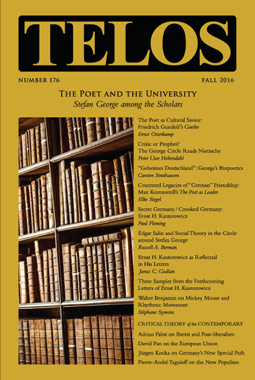In addition to exploring the history and legacy of the George Circle, Telos 176 (Fall 2016) features a special section of topical writing, introduced here by Russell A. Berman, that continues our ongoing commitment to setting forth a critical theory of the contemporary. Telos 176 is now available for purchase in our store.
 For nearly half a century, Telos has sustained a discussion of critical theory, broadly understood, encompassing various and diverse intellectual traditions and individual thinkers whose work points toward trenchant examinations of our contemporary society and culture. Articles published in the journal operate in various registers—philosophy, political theory, intellectual history, cultural criticism, or more generically “theory”—but despite this range of disciplinary idioms, they each contribute directly or indirectly to the ongoing elaboration of an examination of the present. Beyond their import as contributions to their respective academic fields, Telos articles enhance our ability to articulate the ongoing and constantly evolving critical theory of the contemporary.
For nearly half a century, Telos has sustained a discussion of critical theory, broadly understood, encompassing various and diverse intellectual traditions and individual thinkers whose work points toward trenchant examinations of our contemporary society and culture. Articles published in the journal operate in various registers—philosophy, political theory, intellectual history, cultural criticism, or more generically “theory”—but despite this range of disciplinary idioms, they each contribute directly or indirectly to the ongoing elaboration of an examination of the present. Beyond their import as contributions to their respective academic fields, Telos articles enhance our ability to articulate the ongoing and constantly evolving critical theory of the contemporary.
Discussions and debates in Telos have ranged freely along the right/left spectrum, trying to adapt historical critiques of alienation, incubated in other centuries, to changed (and some not-so-changed) circumstances today. Over the past decades our points of orientation have included questions of the new class, populism and federalism, autonomy and sovereignty, particularity and universalism, the question of popular culture, and the astonishing durability of tradition and religion. In order to make even more explicit the pertinence of the Telos perspective to issues today, we are including this special section on some current topics. None of the four pieces included should be taken as the definitive position of the journal: no party line here. We hope to include similar topical commentary in upcoming issues (and other related material can be found online at our website in the TelosScope blog, where comments are welcome).
For decades the dream of a united Europe radiated an idealism intended to heal a war-torn continent; in retrospect, however, after the UK vote to leave the European Union, one cannot avoid the question as to how that dream turned into a bureaucratic nightmare without popular support or democratic credibility. Was it always about some hidden agenda, or did the originally legitimate project take a wrong turn along the way? However that history is eventually written, the inevitability of a greater and more perfect union is, to the say the least, no longer guaranteed. We do not yet know the full ramifications of the Brexit vote, but we can examine the decision closely, as do Telos editors Adrian Pabst and David Pan. Pabst provides compelling insight into the texture of the vote as well as to the parallelism between Brexit and the Trump phenomenon in the United States. Pan teases apart the tensions between the EU version of cosmopolitanism—who benefits from that—and competing models of democratic nationalism, imperial multiculturalism, and individualist liberalism. Parsing this landscape of political-theoretical concepts is crucial for any anatomy of Brexit.
One (but only one) part of the Brexit choice reflected anxieties about immigration, and the symbol of EU immigration has been Angela Merkel’s Germany and the welcome it has extended to well more than a million purported refugees, especially from the war in Syria. Jürgen Kocka’s commentary describes the extraordinary size of the refugee wave of the past year and—while respecting the ethical obligation to shelter refugees—he points out how Berlin policies have simultaneously put pressure on European integration. Arguably the decision for Brexit was partially a response to Berlin’s unilateral choice to change the rules (the Dublin Convention that stipulated where refugees must apply for asylum). If Dublin could be suspended by fiat in Merkel’s Federal Chancellery, what other EU rules were vulnerable? Better exit now than sorry later, some might have argued.
The response to the EU regime that appears to be sweeping Europe has been labeled populism, with right-wing versions (the National Front in France) and left-wing versions (Syriza in Greece). The rhetoric involves a refusal of conventional politics, hence a sort of brute rudeness (at least from the standpoint of the expected politeness of the political class), animosity toward elites, and anti-globalization gestures that can take the shape of opposition to trade as well as xenophobic rejections of foreigners. Hence the connection between the refugee debate, especially in Germany, and the rise of populism across the continent. Indeed the immigration–populism dialectic in Europe cries out for a comparison to political debates in the United States. In an interview, Pierre-André Taguieff examines populism, in particular its anti-elitist dimension. Following Raymond Aron, he reminds us of how the concept of nation arose, at least in the French tradition, as a program for inclusiveness, the mandate that the whole nation participate in self-government. The prospect of erasing nationality—as in the EU agenda or in progressive internationalism—runs the risk of subverting the democratic aspiration inherent in the concept. Populism emerges then “as the reminder of the demand of equality among citizens . . . and of the principle of similarity between the governing and the governed.” The broken promise of equality, in economic terms to be sure but more broadly in terms of culture and even just respect, is fueling the populist eruption and mixing up the left/right alignments of the recent past. Brexit, immigration, and populism: what has been playing out in Europe has been a preview of the American presidential election season.








